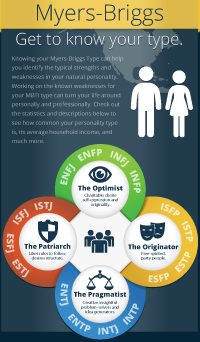Career Tips for INTJ Personality Types (Introverted- Intuitive-Thinking-Judging).

Read about The Myers-Briggs® Test INTJ Personality Type Career Tips and other Occupational Information
Prior to occupation selection are four components of the career exploration process, with the first being goal setting, followed by gathering information, then networking, and finally, decision making. In accordance with the MBTI® type, each will approach these steps differently based on their natural personality function. Isabel Myers and Katharine Briggs used Carl Jung’s psychological theories to develop the Myers-Briggs Type Indicator® (MBTI®) to assist with meaningful personal and professional growth. Jung’s psychological theories are based on his studies which categorized individuals into different dichotomies based on specific attributes. This tool provides useful information regarding strengths and weaknesses to help identify one’s best-fit career. The Myers-Briggs® Test is commonly used prior to the selection of an occupation in order to find a position that suits personality similarities with like-minded colleagues.
INTJ Personality Types (Introverted-Intuitive-Thinking-Judging) and Career Choice.
Individuals who report as an INTJ personality type are, for the most part, grouped into two occupational categories, though they are known to fall into other occupational areas as well. The first is an association with careers in the sciences, with the second being applied sciences such as architecture and engineering. They have also been known to fall into occupational concrete categories such as contracting, computer programming, security analytics, and law. Either job category allows an INTJ to reasonably interpret obstacles and construct innovative solutions. This personality type tends to naturally become leaders in their field of choice due to their comprehensive perspective. They are innate investigators who are skilled at strategizing and have a tenacity for conceptual design. Tedious routine represses their creativity, but when INTJs use their Intuition, they can develop complex structures and an outlook of the future by being insightful, creative synthesizers.
Some occupations INTJs are typically associated with Anesthesiologist, Electronics Engineer, Biochemist, Industrial Engineer, Biologist, Information Security Analyst, Chemical/Nuclear Engineer, Lawyer, Computer Programmer, Surgeon, Survey Researcher, Natural Sciences Manager, Medical/Plant Scientist, Management Consultant, or Architect. This personality type will take any opportunity to solve complex problems. INTJ personality types typically do not approve of inefficiency, clutter, or distraction and have the ability to provide clear and concise instruction. Often leading private, reserved, personal lives will transpose to their career environments, sometimes leading others to believe they seem unapproachable. Suppose an INTJ chooses an occupation in which their expertise is unappreciated. In that case, this may have a negative effect on them, causing them to behave impatiently, critical, uncompromising, uncompliant, and even possibly “shut down” their growth within the organization.
INTJs are known to have inceptive minds and a great initiative for the implementation of their ideas, and a great ability to achieve their goals. They can expeditiously see patterns in extraneous proceedings and may develop long-range explanatory perspectives. When committed, an INTJ often will organize a job and carry it through. Often skeptical and independent, this personality type frequently will have high standards of competence and performance not only for themselves but also for others. INTJs work best in an environment that expects them to complete a variety of tasks, provides a clear structure, and allows for independence. However, it is reported that INTJ personality types’ most important features of an ideal job allow for creativity and originality.
INTJ Personality Types Goal Setting and Gathering Information.
The first step in the career exploration process is to set goals. This personality type often will instinctively set multiple long-term utopian ambitions and will create an action plan to achieve them. Due to this behavior, an INTJ may have difficulty appropriating unplanned issues. These individuals might even become upset with impromptu circumstances. When INTJs are taking part in this process, it will benefit them to establish specific goals which lead up to their objective, allowing them to make a choice between alternative options. For example, the creation of a timeline, which includes several smaller goals, keeping the end game in mind. This personality type is also encouraged to consider positions that are altogether unprecedented and possibly not previously contemplated.
INTJ personality types should gather information in lieu of setting these goals in order to avoid neglecting essential information about the sought-out occupations. This personality type typically will begin this gathering information process by reading about current openings while searching for prospects that allow for advancement and education. They may research trends related to their desired goals, with innovation and growth being weighted with great importance. INTJs can benefit from constructing a “short list” of the possibilities which they find most interesting. Narrowing prospective occupational options should allow this personality type to concentrate on the specific details necessary to procure employment, in turn reducing their timeline objectives. INTJs can also visit an online resource to widen their information sourcing. Another way for them to expand the regulation of information gathered is to make contact with experts in their anticipated field.
INTJ Personality Types and Networking.
Networking can be the most difficult step of the career exploration process for INTJs. They typically have less of a desire to reach out to others in their prospective occupations but realize the logic behind doing so. INTJs have an appreciation for these experts, knowing they provide valuable information, and will establish a connection with purposefully selected individuals. Often INTJs will attempt to bypass networking, proceeding straight to decision-making without incorporating all necessary information, which could change their entire outlook on a prospective occupation. This conduct may often lead to missed opportunities that could have materialized during this networking phase. Once INTJ modifies this behavior, their connections with others will allow them to emphasize their capabilities and their heightened comprehension ability.
Beginning a networking campaign with close friends and family who can introduce an INTJ to additional contacts will be a contributive place for an INTJ to begin. These familiar individuals will also be able to assist with the practice and preparation for important interviews. It is common for an individual with this personality function to appear restrained, quiet, and hesitant when emphasizing their strengths, so practicing interview skills beforehand can help an INTJ to gain confidence, raise their voice, and make a realization for themselves what their strengths may be. Traditionally, an INTJ will focus on their potentialities of themselves and their performance in a prospective vocation. When interviewing, they should remember to emphasize instead their potential contribution to the immediate future of the company. This personality type is innately task-oriented, so initiating personal connections is a valuable recommendation for them. This rapport-building skill could be the defining factor to be chosen over another candidate. Also, remembering the interviewer may be a part of a different personality dichotomy will also be advantageous for INTJ personality types. For example, taking notice not to appear inordinately pragmatic or lacking interpersonal relations when speaking to a Feeling personality type and not confounding the Sensing type with too many possibilities will help this personality type to participate in a well-rounded conversation. Finding information related to how different personalities react prior to these meetings can generate positive results following an interview or pre-interview networking endeavors.

Read about The Myers-Briggs® Test INTJ Personality Type Career Tips and other Occupational Information
INTJ Personality Types and Decision-Making.
After goals have been established, information has been gathered, and a thorough network campaign has been completed, a decision must be made. It is generally in an INTJs nature to make decisions without considering all of the relevant facts. Most often, this personality type will perform an analysis of their findings (based on logic) by something as simple as a “pros and cons” list. For example, they may base their decision on which position includes the highest wage, inclusion of benefits, or preferred job title. These are necessary decision-making components for this personality type, as most often, the reason INTJ personality types show dissatisfaction with an occupation is due to a lack of promotion or job security. As such, an individual with this personality type may forget to account for aspects of work-life balance and workplace culture, job location or required commute, or even smaller values like dress code. All of these are important components when making a momentous career choice. Focusing solely on the logical aspects of the position may cause an occupational selection that overlooks an INTJs applicable needs.
Some high-priority personal values reported by INTJ personality types are health, family, achievement, autonomy, and financial security. In order for an INTJ to avoid the common behavior of neglecting these values when decision making, they may want to create an additional “pros and cons” chart which focuses solely on personal wants and needs or to merely include these values within their original analysis. It may seem foolish to an INTJ to choose a career that has a lower wage simply because they are able to fulfill a personal desire, but in doing so, the chances of longevity in the career tend to increase. Another suggestion for INTJs is for them to take a period of rest and reflection before making a life-changing career decision. This type of individual predictably finds enjoyment in closure, so it is common for them to make perfunctory decisions in order to speed up the entire career exploration process and begin their new livelihood. Instead, by taking this restful step backward, their odds of making a more informed decision increase. This period of rest should be one which is set on their goal timeline during the Setting Goals phase of the career exploration process. Also, taking the Myers-Briggs Type Indicator® (MBTI®) Assessment to know personality commonalities within particular dichotomies can help guide the entire career exploration process by allowing for the modification of inherent behaviors, which may lead to potential obstacles. In doing so, an INTJ has an increased chance of securing occupational satisfaction.
Learn More About the MBTI INTJ Personality Type
Explore additional information that delves deeper into the ENTJ Personality Type by examining various personality and career-based subjects:
- How the MBTI INTJ Type relates to Innovation
- How the MBTI INTJ Type relates to Project Management
- How the MBTI INTJ Type relates to Emotional Intelligence
- How the MBTI INTJ Type relates to Leadership
- How the MBTI INTJ relates to Communication
- How the MBTI INTJ Type relates to Decision Making
- How the MBTI INTJ Type deals with Change
- INTJ Personality Type Career Resource
Click on the link below to read more about different MBTI Personality Types
| ISTJ | ISFJ | INFJ | INTJ | ESTP | ESFP | ENFP | ENTP |
| ISTP | ISFP | INFP | INTP | ESTJ | ESFJ | ENFJ | ENTJ |
References
Introduction to Type (Isabel Briggs Myers, 1998, CPP Inc.)
Introduction to Type and Careers (Allen L. Hammer, 2007, CPP Inc.)


